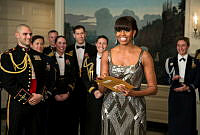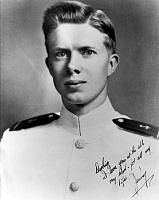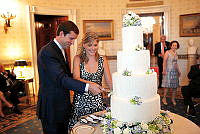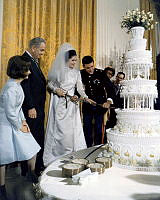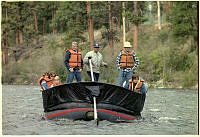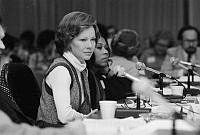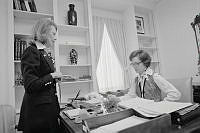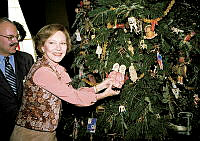Eleanor Roosevelt's "My Day," 12/10/1943
The Artist's Value to the Public
Copyright © White House Historical Association. All rights reserved under international copyright conventions. No part of this article may be reproduced or utilized in any form or by any means, electronic or mechanical, including photocopying, recording, or by any information storage and retrieval system, without permission in writing from the publisher. Requests for reprint permissions should be addressed to books@whha.org
WASHINGTON, Thursday—The other day Dr. Wu Yi-Fang1 lunched with me and brought me a little piece of embroidery from the students at the women's college, of which she is president. It is the Ginling College, in Chentu. In China there are only two women's colleges, but a great number of co-educational universities have sprung up during the war, because of the great shortage of college trained man power.
They need doctors, engineers, chemists, etc., in great numbers. Their difficulties are not a shortage of man power for the army, but a shortage in the field of higher education and in the branches of the service where the knowledge of some profession is required.
Even in areas which are under constant attack, universities have carried on in caves. Men in the army have been given leave to attend courses, so as to prepare themselves for the work of the present and the future.
Some of their beautiful handicraft work may suffer in the future, for it looks as though a great period of industrial development lies ahead for them. In such periods, there is rather less time for the perfection of detailed work which has made artists and craftsmen in China famous in the past. If living standards go up, this kind of work will have to be subsidized there, as it should be subsidized here.
We can only hope that they will see the need and do so from the beginning, instead of going through the long fight for the recognition of the artist's value to the public and his or her contribution to modern civilization. We are only beginning to grasp this here.
Dr. Wu Yi-Fang is here working on post-war problems as a representative of the Chinese Government. I am sure she will make a very fine contribution, for she knows English well and is a charming and easy person with whom to become acquainted.
Yesterday afternoon and today have been given up largely to seeing individual people and doing the constant mail. Sometimes this mail is quite heart-rending, for there is nothing one can do in many cases. Yet, it seems incredible to many people that this should be the case. One poor mother writes me about her son who failed, for apparently entirely understandable reasons, to live up to Army regulations.
She can not see why the inevitable punishment has to be meted out to him, when he had no intention of doing wrong. The lesson, that not our intentions but only our actual performance is taken into account, is one of the most difficult things for all young people to learn. Often it's equally hard for the parents, who usually try so hard to understand their children that they forget to tell them once they are out of the maelstrom of life only performance will be taken into account.
E.R.
Copyright, 1943, by United Feature Syndicate, Inc.





